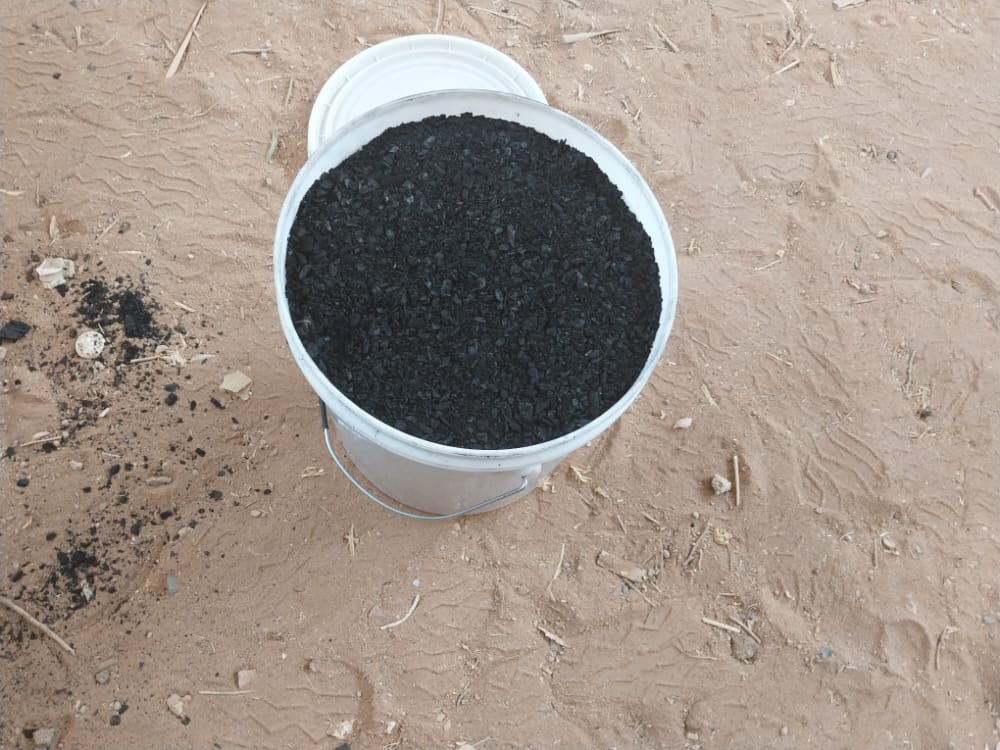Biochar Mechanism in Enhancing Soil Fertility and Crop Productivity
The use of biochar in farming is a revolutionary pollution-free solution currently adopted by farmers as one of the conservation agriculture practices advocated by USAID’s Current and Emerging Threats to Crops Innovation Lab (CETC IL). Much research has demonstrated the relevance of fertilisers in boosting soil fertility and productivity but also indicated that excessive usage of inorganic fertilisers has a leaching impact on soil, necessitating farmers' use of organic fertilizers.
In encouraging farmers to adopt environmentally friendly methods to tackle the pest and diseases problem in Africa, Dream Team Agro Consultancy Limited, has conducted several experiments in farms from Kenya to determine the efficiency of biochar in improving soil fertility, parasitoids in combating fall armyworms in maize, intercropping, kichawi kill for controlling striga and conservation agriculture.
The use of biochar, a black carbon-rich solid product obtained by burning dry plant remains such as tree trimmings, and scrap wood in the presence of less oxygen has been identified as a cost-effective technique.

Biochar as a vaccine for the soil
By adding biochar to the soil mix, it has the effect of reducing soil acidity by increasing soil ph. Free bases contained within the biochar, such as calcium (Ca), magnesium (Mg), and potassium (K), are released into the soil solution, resulting in a net increase in soil ph and exchangeable bases in the soil.
Biochar has a porous nature that helps improve soil’s water retention and water-holding capacity. Researchers find these beneficial properties to the micropores linked to biochar which have a larger volume of pores that correlates to better water retention and holding capacity.
Biochar, which is made up of fine particles, can also improve these characteristics by creating tight pores that hold the water against gravity.
So far, biochar production and training have been introduced to more than fifteen counties in Kenya with plans underway to extend it to other counties.
Evans Lihanda, one of the farmers from Shinyalu, Kakamega County, made a step by implementing the resourceful information he acquired from training on his farm.
“I used to harvest three sacks of maize in my one-and-a-half acre,” he said.
Lihanda, who once shifted from maize to sugar cane farming, says he opted to change to the latter after experiencing a decrease in production every season and unprecedented losses.
“Having been in farming for more than 20 years, my first 10 years were prosperous before I began noticing a decline in production. At first, I thought it was something to do with the quantity of fertilizer I was applying. I opted to increase the amount of fertilizer with the hope of increasing my productivity. I can now apply biochar in my soil to help amend my soil." He concludes.
Biochar solves the problem caused by the use of excess synthetic fertilizers
Chemical fertilizers are known to alter the ph of the soil, increase pests, increase acidification in the soil, and form soil crusts. These factors can result in a decrease of organic matter, humus, and useful organisms in the soil, stunting plant growth, and even being responsible for greenhouse gas emissions, something unknown to Lihanda.
“Biochar not only helps to maintain water in the soil but also improves its drainage, and helps to store carbon in the soil for up to 1,000 years. It is a good alternative to inorganic fertilizers, we urge farmers to embrace the use of chemical-free fertilizers in their farms,” said John Maiyeka, a PlantVillage Dream Team specialist in biochar production.

The use of biochar is swiftly being adopted by farmers in Kenya.
“Use of biochar is cheap as compared to inorganic fertilizers. It can be made simply by a farmer using plant and animal biomass like residential plant trimmings, food processing residues, or forestry cuttings.
“At first I used to harvest two sacks of maize in a quarter acre of land, after being taught about biochar production, I now harvest more than 6 sacks of maize. I am planning to extend my farm to a 2-acre piece of land,’’ said Magaret Musavi, a farmer in Shinyalu, western Kenya.
The application of biochar in the farm not only nourishes soil but also enhances the fixing of nitrogen and limits the presence of pathogens, creating habitats for healthy microorganisms.
“In most cases, you need to charge (mix) the biochar with compost, farm yard manure, and also urine before applying it to the soil. It’s a simple exercise, you soak biochar in urine for two weeks, for compost, biochar is mixed into a compost heap that could take you up to a month. By doing this you will be charging it with relevant nutrients necessary for plant growth,” he said.

The broad application of a low-input sustainable agricultural approach, such as biochar, gives several outstanding answers to sustainability challenges.
Biochar is ecologically friendly, socially ethical, and commercially profitable, addressing all three pillars of sustainability. It contributes to carbon sequestration in the atmosphere, improves soil for both food production and environmental benefit, and saves money for its producers.
If the technology becomes widely available, greenhouse gas levels in the atmosphere will not only stop rising but also begin to fall.
References
(1) Draper, K., & Tomlinson, T. (2015). The potential for biochar to deliver greater sustainability for coffee cultivation and processing: a white paper. Ithaka Institute for Carbon Intelligence and International Biochar Initiative, 24.
(2) Oduor, S. (2022) PlantVillage converting Invasive Mesquite Weed to Money for Pastoralists in Northern Kenya. PlantVillage Blog.
